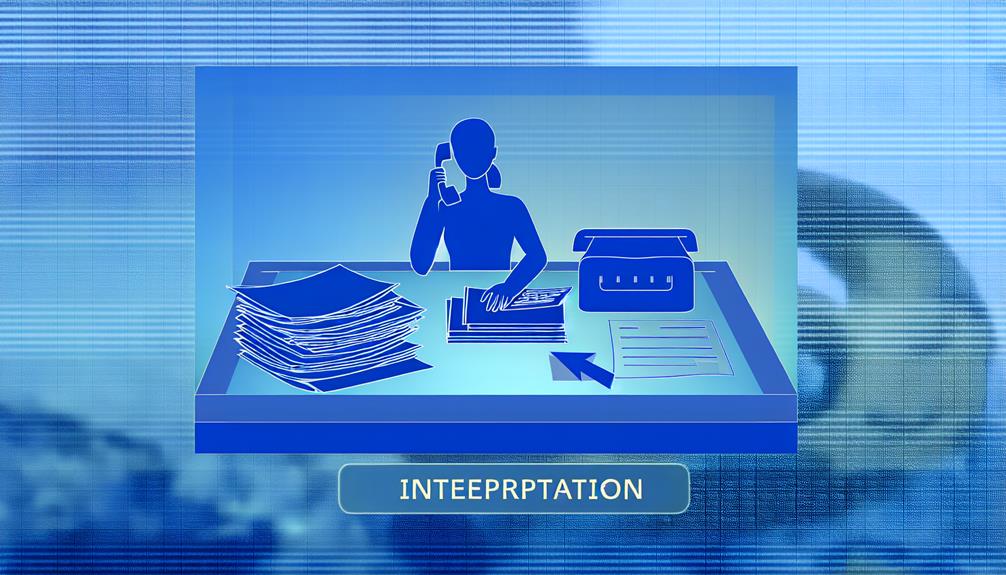Credit counseling provides a personalized approach to debt relief, helping individuals regain control of their finances.
A thorough review of income, expenses, debts, and credit history creates a tailored plan to address debt issues.
Counselors identify underlying debt causes, prioritize debts and expenses, and develop a plan to manage debt and improve credit reports.
By creating a realistic budget, allocating funds strategically, and communicating with creditors, individuals can achieve debt freedom.
With a clear understanding of their financial situation, individuals can break the debt cycle and achieve long-term financial stability, paving the way to a more secure financial future.
Understanding the Credit Counseling Process

The credit counseling process starts with a thorough review of an individual's financial situation, including income, expenses, debts, and credit history.
This in-depth review helps credit counselors understand the individual's financial situation and create a personalized plan to address their debt issues.
It's essential to note that credit counseling can affect an individual's credit score.
A reputable credit counseling agency will minimize any negative effects on credit scores, ensuring the individual's credit score is not compromised unnecessarily.
When selecting a credit counseling agency, choose one accredited by a recognized organization, such as the National Foundation for Credit Counseling (NFCC).
Accreditation is crucial, as it guarantees the agency adheres to strict industry standards and guidelines.
Identifying Causes of Debt
Understanding the underlying causes of debt is crucial for developing an effective strategy for debt relief. Identifying the causes of debt helps individuals address the root of their financial difficulties and create a personalized plan for debt relief.
Common Causes of Debt
| Cause of Debt | Description |
|---|---|
| Emotional Spending | Using credit to cope with emotional stress, anxiety, or depression |
| Lack of Financial Knowledge | Not knowing how to manage personal finances, leading to poor financial decisions |
| Medical Bills | Unexpected medical expenses or ongoing healthcare costs |
| Job Loss or Income Reduction | Losing a job or having a reduction in income, affecting ability to pay debts |
| Relying on Credit Cards | Using credit cards too much for daily expenses or discretionary spending
Creating a Personalized Debt Plan

Creating a personalized debt plan requires a thorough assessment of one's financial situation, debt obligations, and financial goals. A credit counselor works closely with the individual to create a tailored plan that addresses their unique financial circumstances.
This involves identifying areas for improvement, such as budgeting strategies, and setting realistic financial milestones.
Together, the counselor and individual develop a comprehensive plan that outlines specific steps to achieve debt freedom. This may involve restructuring debt, negotiating with creditors, and implementing effective budgeting strategies to manage expenses.
By setting achievable financial milestones, individuals can track their progress and stay motivated throughout the debt repayment process.
A well-crafted debt plan also takes into account an individual's income, expenses, and debt obligations, ensuring that they are making the most of their financial resources.
With a clear plan in place, individuals can regain control of their finances and make steady progress towards becoming debt-free.
Working with a credit counselor helps individuals create a personalized debt plan that addresses their unique needs and sets them on a path towards long-term financial stability.
Prioritizing Debts and Expenses
When dealing with multiple debts and expenses, it's crucial to prioritize them wisely to avoid financial chaos.
A credit counselor can help you create a customized plan to tackle your debts and expenses.
To prioritize effectively:
Focus on necessities: Pay essential expenses like rent/mortgage, utilities, and food first.
Address urgent debts: Prioritize debts with high interest rates or urgent deadlines, such as overdue bills or collection agency debts.
Allocate funds strategically: Assign specific funds to each debt or expense based on priority.
Monitor and adjust: Continuously track expenses and debt progress to adjust your budgeting strategies as needed.
Communicating With Creditors Effectively

Communicating with creditors is crucial to resolve debt issues.
To negotiate favorable terms, it's essential to be proactive, transparent, and respectful.
This process, known as debt validation, helps prevent creditor harassment and protects consumers from unfair practices.
It involves verifying the accuracy of the creditor's claims and ensuring they have the necessary documentation.
Effective communication can lead to reduced interest rates, waived fees, or even settlements.
Credit counseling agencies can provide guidance on creditor negotiation and debt validation.
By being proactive and respectful, individuals can take control of their debt and work towards a debt-free future.
Effective communication is critical in resolving debt issues, and seeking professional help can make a significant difference.
Managing Debt and Credit Reports
Maintaining a healthy credit report is crucial for achieving long-term financial stability. A credit counselor can help navigate the complexities of credit reporting and provide guidance on credit score optimization.
By analyzing your debt-to-income ratio, a credit counselor can identify areas for improvement and develop a personalized plan to get you back on track.
Some alarming facts about debt and credit reports:
79% of credit reports contain errors, which can negatively impact your credit score.
1 in 5 Americans have debt in collections, damaging their credit reports.
The average American has $38,000 in debt, making it difficult to achieve financial stability.
Credit reports are used in 60% of hiring decisions, making a good credit score vital for career advancement.
A credit counselor can help address these issues and develop a plan to manage debt and improve credit reports.
Working together, you can achieve a healthier financial future and regain control of your financial well-being.
Building Healthy Financial Habits

Establishing healthy financial habits is crucial for achieving long-term financial stability and security in the real estate industry.
This involves developing financial discipline, which enables individuals to make conscious spending decisions and prioritize their financial goals.
By adopting simple budgeting strategies, individuals can allocate their income effectively, track their expenses, and make adjustments as needed.
A well-structured budget helps identify areas of unnecessary expenditure, allowing individuals to redirect funds towards debt repayment, savings, and investments.
Developing healthy financial habits also involves breaking unhealthy patterns of behavior, such as impulse purchases and emotional spending.
By recognizing and addressing these habits, individuals can develop a more mindful and intentional approach to their finances.
Healthy financial habits promote a sense of accountability and responsibility, encouraging individuals to take control of their financial lives.
Avoiding Debt Traps and Scams
In the real estate industry, many individuals fall prey to debt traps and scams due to a lack of financial literacy or a sense of urgency to resolve financial difficulties quickly. Debt predators prey on vulnerable individuals, promising quick fixes and misleading solutions that only exacerbate financial woes.
It is crucial to exercise caution and vigilance when seeking debt relief.
To avoid falling into debt traps and scams, be cautious of unsolicited offers that promise instant debt relief or guaranteed loan approvals.
Misleading advertising that creates unrealistic expectations or hides hidden fees can also be a warning sign.
Additionally, beware of unlicensed or uncredentialed advisors who lack the expertise to provide reliable guidance.
Upfront fees that require payment before any services are rendered are also a red flag.
Maintaining Long-Term Financial Stability

Maintaining Long-Term Financial Stability
To achieve long-term financial stability, it's essential to have a well-planned and disciplined approach.
This means setting realistic goals, prioritizing needs over wants, and developing good financial habits.
It's crucial to understand personal finance and be committed to responsible money management.
Being financially literate helps individuals make informed decisions about their financial resources.
Building an emergency fund is vital, as it provides a safety net during unexpected expenses or financial shocks.
By prioritizing savings and investing in a diversified portfolio, individuals can create a stable financial foundation that supports their long-term goals.
By combining financial literacy with a disciplined approach to saving and investing, individuals can break free from debt and achieve lasting financial stability.
This leads to a more secure financial future, allowing individuals to focus on their long-term goals, such as buying a home, investing in real estate, or achieving financial freedom.
Conclusion
How Credit Counseling Can Help You Get Out of Debt
Understanding Credit Counseling
Credit counseling is a crucial step towards achieving financial freedom. It involves working with a certified credit counselor to assess your financial situation, identify areas of improvement, and develop a personalized plan to eliminate debt. This process requires commitment and dedication.
Identifying Causes of Debt
Debt accumulation often results from overspending, job loss, medical emergencies, and credit card abuse. Identifying the underlying causes of debt helps develop an effective debt management plan. A credit counselor helps individuals recognize patterns and habits that contribute to debt, enabling them to make informed decisions about their financial future.
Creating a Debt Plan
A credit counselor works with individuals to create a tailored debt plan, customized to their unique financial situation. This plan outlines strategies for debt reduction, expense management, and credit score improvement. By prioritizing debts and expenses, individuals can focus on eliminating high-interest debts initially, while making consistent payments on other debts.
Prioritizing Debts and Expenses
Prioritizing debts and expenses is key in debt management. A credit counselor helps individuals categorize debts into needs and wants, distinguishing between necessary expenses and discretionary spending. This process enables individuals to allocate resources efficiently, ensuring that necessary expenses are met while making progress towards debt elimination.
Communicating With Creditors
Effective communication with creditors is essential in debt management. A credit counselor helps individuals negotiate with creditors, reducing interest rates, waiving fees, and establishing realistic payment plans. This collaborative approach fosters a positive relationship between debtors and creditors, increasing the likelihood of successful debt resolution.
Managing Debt and Credit Reports
Credit reports play a significant role in debt management, providing a detailed overview of an individual's credit history. A credit counselor helps individuals understand their credit reports, identifying areas for improvement and developing strategies to optimize credit scores. By monitoring credit reports regularly, individuals can detect errors, prevent identity theft, and track progress towards financial stability.
Building Healthy Financial Habits
Developing healthy financial habits is crucial in maintaining long-term financial stability. A credit counselor educates individuals on effective budgeting, saving, and investing techniques, empowering them to make informed financial decisions. By adopting healthy financial habits, individuals can break the debt cycle and achieve lasting financial freedom.
Avoiding Debt Traps and Scams
Debt management involves avoiding pitfalls, including debt traps and scams. A credit counselor helps individuals recognize and avoid these pitfalls, ensuring they do not fall prey to predatory lending practices or misleading debt relief schemes.
Maintaining Financial Stability
Achieving financial stability requires a long-term commitment to responsible financial management. A credit counselor provides ongoing support and guidance, helping individuals navigate unexpected financial setbacks and stay on track towards financial freedom.
Financial Freedom
Debt can be overwhelming, but credit counseling offers a solution, empowering individuals to break free from debt and chart a course towards financial freedom. By embracing this process, individuals can transform their financial futures, emerging stronger, wiser, and debt-free.

Leave a Reply
You must be logged in to post a comment.